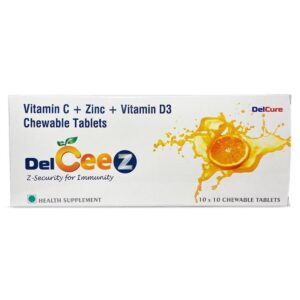ZINC + VITAMIN C + VITAMIN D3 (CHOLECALCIFEROL)
Zinc: Zinc is a mineral that is essential for the proper functioning of the body. It is commonly used as a dietary supplement and is also found in various foods.
Use:
Zinc supplements are used to prevent or treat zinc deficiency, which can occur in people with certain medical conditions, such as malabsorption syndromes or chronic liver disease. It is also commonly used to support the immune system and promote wound healing. Additionally, zinc has been studied for its potential benefits in reducing the duration and severity of the common cold, although the evidence is mixed.
Mechanism of Action:
Zinc is involved in numerous enzymatic reactions in the body and plays a vital role in immune function, protein synthesis, DNA synthesis and repair, and cell division. It also has antioxidant properties, helping to protect cells against damage from free radicals.
Dose:
The recommended daily intake of zinc varies depending on age, sex, and specific health conditions. The average daily intake for adults is around 8-11 mg for females and 11-12 mg for males. Higher doses may be recommended for individuals with zinc deficiencies or specific health concerns. It is important to follow the dosage instructions provided by healthcare professionals or indicated on the product packaging.
Side Effects:
Zinc is generally considered safe when taken orally at recommended doses. However, excessive consumption of zinc supplements can lead to adverse effects, including nausea, vomiting, diarrhea, abdominal cramps, and headache. Long-term excessive intake of zinc can interfere with the absorption of other essential minerals, such as copper, iron, and magnesium. It is important to consult with a healthcare provider before starting any new supplement regimen, especially for pregnant or breastfeeding women, as excessive zinc intake can be harmful to the developing fetus or infant.
Additionally, zinc nasal sprays and gels have been associated with a potential loss of sense of smell, known as anosmia. These products should be avoided, especially since zinc intake through the diet or oral supplements is usually sufficient to meet the body’s requirements.
Overall, zinc is a beneficial mineral when taken in appropriate doses, but it is important to use it as directed and consult with a healthcare provider if there are any concerns or questions.
Vitamin C: Drug: Vitamin C
Use: Vitamin C, also known as ascorbic acid, is a water-soluble vitamin that plays a crucial role in various body functions. It is primarily used as a dietary supplement to prevent or treat vitamin C deficiency. It is also utilized in the treatment of certain conditions like scurvy, common cold, and iron deficiency.
Mechanism of Action: Vitamin C acts as a powerful antioxidant in the body, helping to protect cells from damage caused by free radicals. It is involved in the synthesis of collagen, a protein necessary for the formation and repair of tissues in the body. Vitamin C also enhances the absorption of iron from plant-based foods, boosts the immune system, and assists in the proper functioning of several enzymes.
Dose: The recommended daily dose of vitamin C varies depending on age, sex, and individual needs. For adults, the recommended daily allowance (RDA) is about 75-90 mg for women and 90-120 mg for men. However, this dosage may be adjusted for individuals with specific health conditions or requirements. It is available as oral tablets, capsules, chewables, and in liquid form.
Side Effects: Vitamin C is generally considered safe when taken within the recommended doses. However, excessive intake can lead to certain side effects, most commonly diarrhea, nausea, stomach cramps, and gastrointestinal disturbances. High doses of vitamin C can also increase the risk of kidney stones in susceptible individuals. People with existing kidney disorders should be cautious while supplementing with vitamin C. Rarely, allergic reactions and skin rashes may occur.
It is important to note that excessive intake of vitamin C will not provide additional health benefits and may lead to adverse effects. It is crucial to consult a healthcare provider before starting any supplementation regimen to determine the appropriate dosage for individual needs.
Vitamin D3 (cholecalciferol): Vitamin D3, also known as cholecalciferol, is a form of vitamin D that is naturally produced in the skin when exposed to sunlight. It is also available as a dietary supplement.
Use:
Vitamin D3 is primarily used to treat or prevent vitamin D deficiency. It is essential for maintaining healthy bones and teeth and is involved in the absorption of calcium and phosphorus in the body. Vitamin D deficiency can lead to conditions like rickets in children and osteomalacia in adults.
Mechanism of Action:
Vitamin D3 functions as a prohormone and undergoes two hydroxylation processes in the liver and kidneys to become the active hormone, calcitriol. Calcitriol acts on specific receptors in the intestines, bones, and kidneys to regulate calcium and phosphorus metabolism.
Dose:
The recommended dose of vitamin D3 varies depending on the age, individual needs, and the severity of deficiency. The following are the general daily intake recommendations:
– Infants (0-12 months): 400-1,000 international units (IU)
– Children (1-18 years): 600-1,000 IU
– Adults (19-70 years): 600-1,500 IU
– Adults (>70 years): 800-2,000 IU
It is important to consult a healthcare professional to determine the appropriate dose for specific needs.
Side Effects:
Vitamin D3 is generally safe when taken within the recommended doses. However, excessive intake can lead to vitamin D toxicity, known as hypervitaminosis D. Symptoms of toxicity include nausea, vomiting, loss of appetite, increased thirst and urination, constipation, abdominal pain, weakness, and weight loss. High levels of vitamin D can also raise blood calcium levels, potentially leading to kidney stones and calcification of soft tissues.
It is important to note that vitamin D3 supplements may interact with certain medications, such as corticosteroids, anticonvulsants, and certain weight loss drugs. Therefore, it is advisable to consult a healthcare professional before starting vitamin D3 supplementation.
Overall, vitamin D3 plays a crucial role in maintaining bone health and preventing deficiency-related conditions. However, it is important to take it within the recommended doses and under the guidance of a healthcare professional to avoid unwanted side effects.



